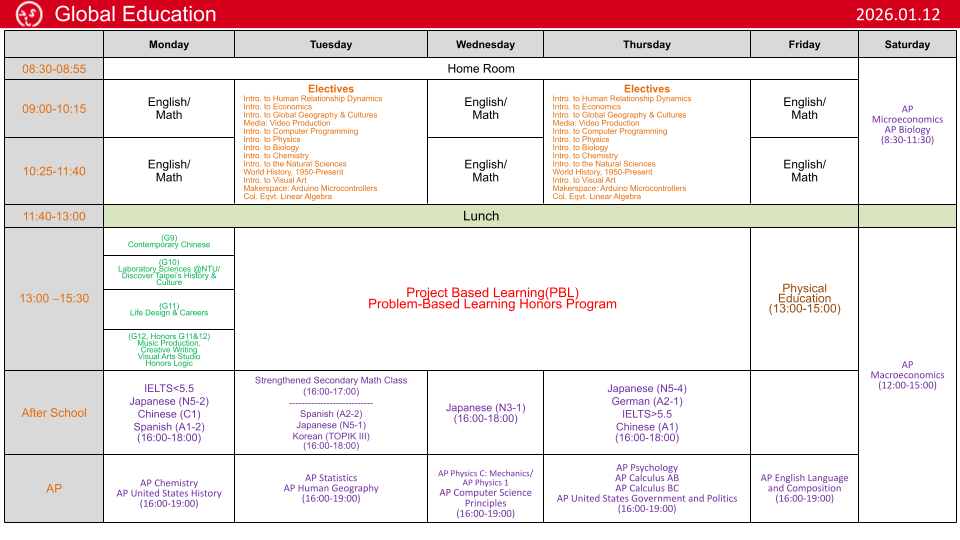The curriculum at VIS aims to prepare students for global citizenship, regardless of where in the world they end up calling home. Towards that end, VIS places an emphasis on fundamental communicative, collaborative, & creative thinking practices across the curriculum. Students learn through engaging in Project / Problem-Based Learning (PBL), both in disciplinary courses and in the flagship Interdisciplinary PBL program.
In grades 9, students engage in a structured curriculum that ensures they acquire the ability to construct & analyze written arguments across genres, perform mathematical operations and reason mathematically, engage in scientific inquiry by conducting investigations in the Taipei area, develop global geographic knowledge, and apply the historical method of inquiry to global & Taiwanese history.
In grades 10-11, students develop their own academic profiles by selecting from a variety of elective courses and, when appropriate to their learning, engaging in cooperative educational programs across Taipei, including in research & medical laboratories, local universities, and a number of professional offices.
In grade 12, students propose, develop, and complete a Capstone Project that involves deep inquiry into a global problem’s local manifestation of their own selection, and for which they design, build, and implement a locally-focused solution.
To ensure that students are challenged at an appropriate level of rigor, disciplinary courses at VIS are based on the learning standards outlined in the Ontario, Canada provincial curriculum.
Each course at VIS also emphasizes a connection to one of the core VIS values, and a connection to at least one of the UN Sustainable Development Goals (SDGs) for 2030. This ensures that students develop not just content knowledge, but an awareness of their roles as global citizens.
Students also have the choice to take a variety of evening electives. These include a variety of Modern Language classes, including French, Spanish, Japanese, Korean, and focused studies in Chinese Languages; these courses empower students to develop their language skills beyond the English language so that students develop as global citizens. Evening electives also include Advanced Placement courses; this option is most useful for students interested in continuing their studies in the American educational system.
VIS 的課程旨在培育具備國際視野的世界公民,不論未來學生身處世界各地,都能自信迎接挑戰。課程核心強調溝通力、合作力與創意思維,並將其融入各學科的學習過程。學生透過專案/問題導向學習(Project / Problem-Based Learning (PBL)),不僅在學科課程中實踐,更能在跨學科專案課程中深入探索,培養面對現實世界議題的能力。
九年級:
- 在這個階段,學生接受完整且有系統的學習安排,確保他們能夠:
- 建構並分析書面論證;
- 培養數學運算與邏輯推理能力;
- 進行以台北地區為基礎的科學探究與實地研究;
- 發展全球地理知識;
- 透過歷史探究的方法,理解世界與台灣的歷史發展。
十至十一年級:
- 學生可依照興趣與學習需求,選修多元課程,並參與台北地區的協同教育計畫。例如:
- 進入研究或醫學實驗室;
- 參與大學專案;
- 進入各類專業機構實習。
- 透過這些機會,學生逐步建立屬於自己的學術與專業履歷。
十二年級:
在最後一年,學生將提出、規劃並完成 Capstone Project。此計畫要求學生針對一項全球性議題在地化的具體表現進行深入探究,並設計、建構並實際執行一個具有地方影響力的解決方案,展現整合能力與社會責任感。
核心價值與永續發展
VIS 每一門課程皆與 VIS 的核心價值之一符合,並呼應至少一項聯合國 2030 永續發展目標(SDGs)。這樣的安排,不僅讓學生獲得學科知識,更培養學生對全球公民責任的意識。
課後選修課程
VIS 提供多樣的課後修課程,包括:
- 現代語言(法語、西班牙語、日語、韓語及進階中文...等),協助學生拓展多語言能力
- 大學先修課程(AP),適合有志前往美國的學生。

 VIS 國際實驗教育 高中部/國中部/小學部 G05~G12
VIS 國際實驗教育 高中部/國中部/小學部 G05~G12
